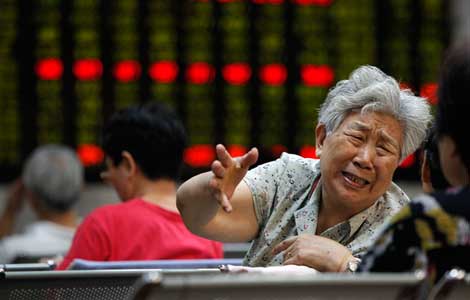Avoid victimizing others
Updated: 2013-07-30 09:13
By Yu Xiang (China Daily)
|
||||||||
But, by retreating from quantitative easing the US will again make emerging economies the victims. The capital outflows have already intensified, as international short-term speculative capital is treating the retreat as a signal that the US economy is going strong, so they are selling out Asian assets on a large scale and putting the money in the US. China's foreign exchange data has mirrored this trend.
The net purchase of foreign exchanges hit a six-month low of 66.86 billion yuan ($11 billion) in May, slumping from 295.35 billion in April and 315.3 billion in average during the first four months of the year, according to data released by the People's Bank of China.
Second, external financial market turmoil has increased. On June 13, out of fear the Fed's FOMC meeting would lead to the decision to quit quantitative easing, emerging markets fell across the board. On June 14, better-than-expected retail sales and employment data boosted emerging countries' markets sharply, but on June 19, after laying out its timetable for quitting quantitative easing, the Morgan Stanley Emerging Markets Index dropped 4 percent and the Hong Kong stock market fell 2.88 percent. Since the beginning of the year, emerging markets have dropped about 20 percent.
Third, emerging economies' monetary policies are trapped. On June 13, Indonesia's central bank unexpectedly announced its intention to raise the benchmark interest rate by 25 basis points to 6 percent. Only two days ago, the Indonesian central bank raised its overnight deposit rate. Brazil is in the same situation as Indonesia. Within several months, Brazil has raised its benchmark interest rate twice. On May 29, Brazil's central bank dramatically raised the benchmark interest rate by 50 basis points, far more than expected. Additionally, because of the scaling down of quantitative easing, the Indian rupee's rapid depreciation was a key reason India's central bank "reluctantly" kept interest rates unchanged and suppressed the urge to cut interest rates again.
Due to their concerns about the US ending its quantitative easing, the International Monetary Fund, the World Bank, the European Union and South Korea recently asked the US to deal with it carefully and responsibly to prevent economic and financial risks. On July 11, at the fifth round of the China-US Strategic and Economic Dialogue, Chinese Finance Minister Lou Jiwei said the US should take full account of the impact on the world economy, which is the first time a high-level Chinese official has publicly talked about this, indicating a real and potentially big impact on China.
China and the US should grasp this opportunity to deepen China-US relations, as preventing any adverse effects from the US' withdrawal from quantitative easing provides a new platform for cooperation. Increasing the transparency of monetary policy, preventing flows of hot money and strengthening financial supervision are tangible tools to enrich a "new pattern of major power relations".
The author is a research fellow at the Institute of American Studies at the China Institutes of Contemporary International Relations (CICIR). www.chinausfocus.com
Most Viewed
Editor's Picks

|

|

|

|

|

|
Today's Top News
Families of crash victims to sue Asiana in the US
Major SOEs eye profits from abroad
Train collision kills at least 44 in Switzerland
Sino-Japanese summit ruled out
Manila's base plan targets China
Hun Sen's party win to stabilize situation: expert
Beijing plans $81b shantytown renovation project
CMOC buys stake in Rio Tinto
US Weekly

|

|
















